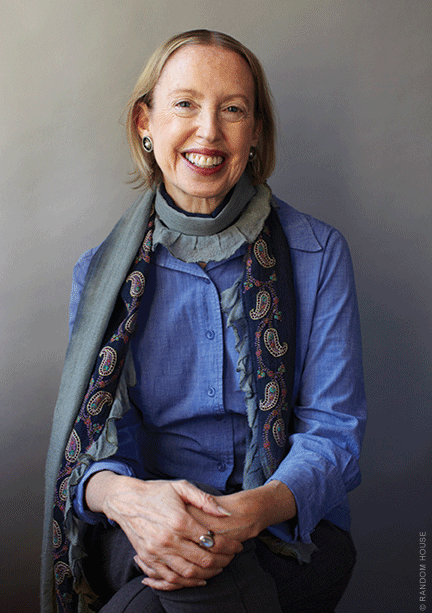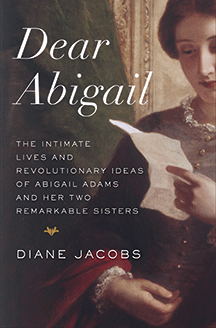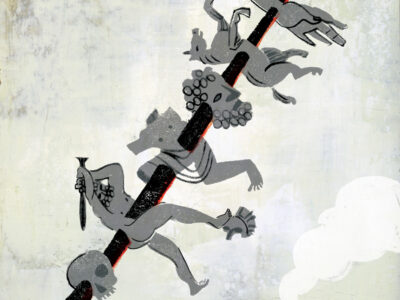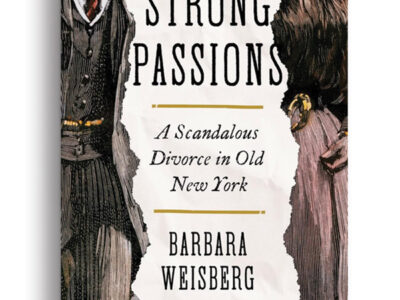 Class of ’70 | “I really think that your Letters are much better worth preserving than mine,” the woman’s husband wrote in 1776, complimenting her reporting skills.
Class of ’70 | “I really think that your Letters are much better worth preserving than mine,” the woman’s husband wrote in 1776, complimenting her reporting skills.
“I find the knowledg [sic] of My having a Letter descriptive of your dress and reception … will introduce me anywhere, ” her sister teased in 1785, impressed by her success as the wife of the new nation’s first ambassador to England.
The writer in question is, of course, Abigail Adams, wife of John, Founding Father and second president of the United States. Anyone with the most cursory interest in early American history has some knowledge of Abigail, and television viewers have still more, thanks to the 2008 miniseries John Adams, starring Paul Giamatti and Laura Linney. But to author Diane Jacobs CW’70, these portraits are incomplete.
“I see so much more to her,” she says. “A lot of her life wasn’t connected to John’s. For one thing, she was extremely loyal to her family—especially her two sisters. And even though she and John were very close and shared many viewpoints, she definitely had her own mind.”
 Jacobs, 65, has just released her latest book, Dear Abigail: The Intimate Lives and Revolutionary Ideas of Abigail Adams and Her Two Remarkable Sisters (Ballantine Books). The title represents the third biography by Jacobs, who started her writing career after earning a master’s degree in film studies from Columbia.
Jacobs, 65, has just released her latest book, Dear Abigail: The Intimate Lives and Revolutionary Ideas of Abigail Adams and Her Two Remarkable Sisters (Ballantine Books). The title represents the third biography by Jacobs, who started her writing career after earning a master’s degree in film studies from Columbia.
After penning movie reviews for The Soho Weekly News and The Village Voice, she published her first book in 1977; it detailed the emergence of an auteur culture. Next came an analytical look at the films of Woody Allen. But it was her third title—a biographical sketch of film director Preston Sturges, a cult favorite among cineastes—that got her interested in exploring creative lives.
“I’ve always loved character—it comes with being an English major at Penn—and I realized, ‘Wow, I love writing biography!’” she says. Looking to stretch, she decided to focus on Mary Wollstonecraft, the 18th-century feminist (and mother of Frankenstein author Mary Shelley) who wrote A Vindication of the Rights of Woman. Jacobs drew in part on a cache of previously unpublished letters from the essayist’s publisher.
Jacobs has also relied on correspondence in her newest book to paint a more fleshed-out portrait of a First Lady best known for, well, a letter.
“In the new Code of Laws which I suppose it will be necessary For [Congress] to make I desire you would Remember the Ladies,” she famously wrote to John. “Do not put such unlimited power in the hands of the Husbands.”
“Abigail wasn’t really a feminist like Wollstonecraft,” says Jacobs, “but she, and her sisters, Mary and Elizabeth, had very strong opinions about women and their place in society.” In a letter to her cousin John Thaxter, for example, Abigail complains: “When a woman posed of a common … understanding considers the difference of Education between the male and female Sex … it is really mortifying.” Why, she continued rhetorically, “should your sex wish for such a disparity in those whom they one day intend for companions.”
“Abigail never lost her sense of irony, that’s for sure,” says Jacobs, pointing out how strongly the distinct personalities of each of the sisters comes across in their writing. “Part of my role was like a sculptor’s—there’s so much to work with, you have to figure out what’s salient and then pare away. You’re saying, ‘This is how I see this character—and this will back it up.’”
The letters offer fascinating descriptions of everyday life mixed with, now and again, outbursts at its indignities. “ For if Ideas present themselves to my Mind, it is too much like the good seed sown among Thorns,’ writes Elizabeth, whose minister husband eventually became an alcoholic abuser. Those ideas, she continues, “are soon erased and swallowed up by the Cares of the World, the wants, and noise.”
Elizabeth was a frustrated writer who dreamed of literary success—hence her often florid style.
“She had the longest education, she read more, and she always felt that she had to prove herself to the other sisters,” says Jacobs, who argues that the equally harried Mary was the “uncrowned queen of the family.”
“She was the eldest, she was a superb administrator,” Jacobs explains. “I don’t like to think that I have a favorite sister, but she was the hardest to bring to life because she was hampered by so much responsibility.” Mary was also hampered by her husband, Richard, who didn’t succeed in a career until late in life.
Middle sister Abigail, of course, did marry well—but she and John endured many periods of separation, leaving her to raise a family of four (a fifth child died before her second birthday) and to run a busy farm.
“She could do everything,” says Jacobs. While her admiration isn’t begrudging, Jacobs laughs in spite of herself. “I never really wanted to write about Abigail Adams,” she says. “She’s had her time in the limelight.” It was while reviewing another book on Abigail that she became intrigued by the sisters. “As I started looking into their lives, I discovered how close they all were.”
And, fortunately for her, she found “amazing troves” of letters in places like the Massachusetts Historical Society, the Library of Congress, and the Albany Institute of History and Art, where Mary’s correspondence ended up. By sifting through additional diaries and news accounts, Jacobs was able to dot the book with illuminating divertissements on life in 18th-century America—from its postal system to the quotidian details of teenage girlhood to the suffering and treatments associated with smallpox, yellow fever, and tuberculosis.
“When I was writing the Wollstonecraft book, I found I liked living in the 18th century,” says Jacobs with a chuckle. “I liked the revolutions, I liked the Enlightenment, I even liked the guillotine!”
For now, though, she’s taking a much-needed break from writing, after spending nearly a decade on this project. In between touring and speaking about the book, she relaxes at her Greenwich Village home with her 14-year-old dachshund, Dexter.
“I’m going to take some time to think,” she says. “Even if I stay in the same period, I’ll probably do it in another country. I want to do something where I have a lot to learn.”
—JoAnn Greco




